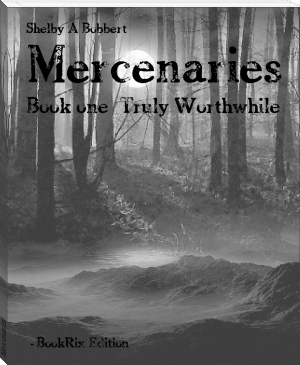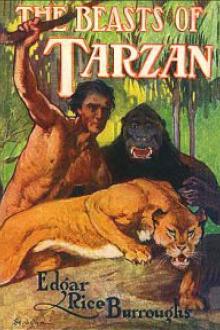The Keepers of the King's Peace, Edgar Wallace [affordable ebook reader .txt] 📗

- Author: Edgar Wallace
Book online «The Keepers of the King's Peace, Edgar Wallace [affordable ebook reader .txt] 📗». Author Edgar Wallace
The old man on the bed called them all by name, and snapped his feeble fingers to them; [Pg 166]but their eyes were on the retort and the crystal drops that trembled and fell from the lip of the narrow spout.
A week later a speechless group stood before the Residency and focussed their astonished gaze upon the miracle.
"The miracle" was a half-grown leopard cub, vividly marked. He was muzzled and held in leash by a chain affixed to a stout collar, and Bones, a picture of smug gratification, held the end of the chain.
"But how—how did you catch him?" gasped the girl.
Bones shrugged his shoulders.
"It is not for me, dear old friend, to tell of nights spent in the howlin' forest," he quavered, in the squeaky tone which invariably came to him when he was excited. "I'm not goin' to speak of myself. If you expect me to tell you how I trailed the jolly old leopard to his grisly lair an' fought with him single-handed, you'll be disappointed."
"But did you track him to his lair?" demanded Hamilton, recovering his speech.
"I beg of you, dear old officer, to discuss other matters," evaded Bones tactfully. "Here are the goods delivered, as per mine of the twenty-fourth instant."
He put his hand to his pocket mechanically, and the cub looked up with a quick eager stare.
[Pg 167]"Bones, you're a wonderful fellow," said Sanders quietly.
Bones bowed.
"And now," he said, "if you'll excuse me, I'll take my little friend to his new home."
Before they realized what he was doing, he had slipped off the chain. Even Sanders stepped back and dropped his hand to the automatic pistol he carried in his hip pocket.
But Bones, unconcerned, whistled and marched off to his hut, and the great cat followed humbly at his heels.
That same night Bones strode across from his hut to the Residency, resolved upon a greater adventure yet. He would go out under the admiring eyes of Patricia Hamilton, and would return from the Residency woods a veritable Pied Piper, followed by a trail of forest denizens.
In his pocket was a quart bottle, and his clothes reeked with the scent of wild aniseed. As a matter of fact, his secret would have been out the moment he entered Sanders's dining-room, but it so happened that his programme was doomed to interruption.
He was half-way across the square when a dark figure rose from the ground and a harsh voice grunted "Kill!"
He saw the flash of the spear in the starlight and leapt aside. A hand clutched at his jacket, but he wrenched himself free, leaving the garment in his assailant's hands.
[Pg 168]He was unarmed, and there was nothing left but flight.
Sanders heard his yell, and sprang out to the darkness of the verandah as Bones flew up the steps.
He saw the two men racing in pursuit, and fired twice. One man fell, the other swerved and was lost in the shadows.
An answering shot came from the Houssa sentry at the far end of the square. Sanders saw a man running, and fired again, and again missed.
Then out of the darkness blundered Ali Abid, his face grey with fear.
"Sir," he gasped, "wild animal (Felis pardus) has divested muzzlement and proper restraint, and is chasing various subjects outrageously."
Even as he spoke a fourth figure sped across the ground before the Residency, so close that they could see the bundle he carried under his arm.
"My jacket!" roared Bones. "Hi, stop him! Good Lord!"
Swift on the heels of the flying man came a streak of yellow fur....
Whether O'ka of the Jumburu outpaced the leopard, or the leopard overtook O'ka, is not known, but until the rains came and washed away the scent of crude aniseed, Bones dared not leave his hut by night for fear of the strange beasts that came snuffling at his hut, or sat in expectant and watchful circles about his dwelling, howling dismally.
[Pg 169]
CHAPTER IX THE MERCENARIESThere was a large brown desk in Sanders's study, a desk the edges of which had been worn yellow with constant rubbing. It was a very tidy desk, with two rows of books neatly grouped on the left and on the right, and held in place by brass rails. There were three tiers of wire baskets, a great white blotting-pad, a silver inkstand and four clean-looking pens.
Lately, there had appeared a glass vase filled with flowers which were daily renewed. Except on certain solemn occasions, none intruded into this holy of holies. It is true that a change had been brought about by the arrival of Patricia Hamilton, for she had been accorded permission to use the study as she wished, and she it was who had introduced the floral decorations.
Yet, such was the tradition of sanctuary which enveloped the study, that neither Captain Hamilton, her brother, nor Bones, her slave, had ever ventured to intrude thither in search of her, and if by chance they came to the door to speak to her, they unaccountably lowered their voices.
[Pg 170]On a certain summer morning, Hamilton sat at the desk, a stern and sober figure, and Bones, perspiring and rattled, sat on the edge of a chair facing him.
The occasion was a solemn one, for Bones was undergoing his examination in subjects "X" and "Y" for promotion to the rank of Captain. The particular subject under discussion was "Map Reading and Field Sketching," and the inquisition was an oral one.
"Lieutenant Tibbetts," said Hamilton gravely, "you will please define a Base Line."
Bones pushed back the hair straggling over his forehead, and blinked rapidly in an effort of memory.
"A base line, dear old officer?" he repeated. "A base line, dear old Ham——"
"Restrain your endearing terms," said Hamilton, "you won't get any extra marks for 'em."
"A base line?" mused Bones; then, "Whoop! I've got it! God bless your jolly old soul! I thought I'd foozled it. A base line," he said loudly, "is the difference of level between two adjacent contours. How's that, umpire?"
"Wrong," said Hamilton; "you're describing a Vertical Interval."
Bones glared at him.
"Are you sure, dear old chap?" he demanded truculently. "Have a look at the book, jolly old friend, your poor old eyes ain't what they used to be——"
[Pg 171]"Lieutenant Tibbetts," said Hamilton in ponderous reproof, "you are behaving very strangely."
"Look here, dear old Ham," wheedled Bones "can't you pretend you asked me what a Vertical Interval was?"
Hamilton reached round to find something to throw, but this was Sanders's study.
"You have a criminal mind, Bones," he said helplessly. "Now get on with it. What are 'Hachures'?"
"Hachures?" said Bones, shutting his eye. "Hachures? Now I know what Hachures are. A lot of people would think they were chickens, but I know ... they're a sort of line ... when you're drawing a hill ... wiggly-waggly lines ... you know the funny things ... a sort of...." Bones made mysterious and erratic gestures in the air, "shading ... water, dear old friend."
"Are you feeling faint?" asked Hamilton, jumping up in alarm.
"No, silly ass ... shadings... direction of water—am I right, sir?"
"Not being a thought-reader I can't visualize your disordered mind," said Hamilton, "but Hachures are the conventional method of representing hill features by shading in short vertical lines to indicate the slope and the water flow. I gather that you have a hazy idea of what the answer should be."
"I thank you, dear old sir, for that generous [Pg 172]tribute to my grasp of military science," said Bones. "An' now proceed to the next torture—which will you have, sir, rack or thumbscrew?—oh, thank you, Horace, I'll have a glass of boiling oil."
"Shut up talking to yourself," growled Hamilton, "and tell me what is meant by 'Orienting a Map'?"
"Turning it to the east," said Bones promptly. "Next, sir."
"What is meant by 'Orienting a Map'?" asked Hamilton patiently.
"I've told you once," said Bones defiantly.
"Orienting a Map," said Hamilton, "as I have explained to you a thousand times, means setting your map or plane-table so that the north line lies north."
"In that case, sir," said Bones firmly, "the east line would be east, and I claim to have answered the question to your entire satisfaction."
"Continue to claim," snarled Hamilton. "I shall mark you zero for that answer."
"Make it one," pleaded Bones. "Be a sport, dear old Ham—I've found a new fishin' pool."
Hamilton hesitated.
"There never are any fish in the pools you find," he said dubiously. "Anyway, I'll reserve my decision until I've made a cast or two."
They adjourned for tiffin soon after.
"How did you do, Bones?" asked Patricia Hamilton.
[Pg 173]"Fine," said Bones enthusiastically; "I simply bowled over every question that your dear old brother asked. In fact, Ham admitted that I knew much more about some things than he did."
"What I said," corrected Hamilton, "was that your information on certain subjects was so novel that I doubted whether even the staff college shared it."
"It's the same thing," said Bones.
"You should try him on military history," suggested Sanders dryly. "I've just been hearing from Bosambo——"
Bones coughed and blushed.
"The fact is, sir an' Excellency," he confessed, "I was practisin' on Bosambo. You mightn't be aware of the fact, but I like to hear myself speak——"
"No!" gasped Hamilton in amazement, "you're wronging yourself, Bones!"
"What I mean, sir," Bones went on with dignity, "is that if I lecture somebody on a subject I remember what I've said."
"Always providing that you understand what you're saying," suggested Hamilton.
"Anyway," said Sanders, with his quiet smile, "Bones has filled Bosambo with a passionate desire to emulate Napoleon, and Bosambo has been making tentative inquiries as to whether he can raise an Old Guard or enlist a mercenary army."
"I flatter myself——" began Bones.
[Pg 174]"Why not?" said Hamilton, rising. "It's the only chance you'll have of hearing something complimentary about yourself."
"I believe in you, Bones," said a smiling Patricia. "I think you're really wonderful, and that Ham is a brute."
"I'll never, never contradict you, dear Miss Patricia," said Bones; "an' after the jolly old Commissioner has gone——"
"You're not going away again, are you?" she asked, turning to Sanders. "Why, you have only just come back from the interior."
There was genuine disappointment in her eyes, and Sanders experienced a strange thrill the like of which he had never known before.
"Yes," he said with a nod. "There is a palaver of sorts in the Morjaba country—the most curious palaver I have ever been called upon to hold."
And indeed he spoke the truth.
Beyond the frontiers of the Akasava, and separated from all the other Territories by a curious bush belt which ran almost in a straight line for seventy miles, were the people of Morjaba. They were a folk isolated from territorial life, and Sanders saw them once every year and no more frequently, for they were difficult to come by, regular payers of taxes and law-abiding, having quarrels with none. The bush (reputedly the abode of ghosts) was, save at one point, impenetrable. Nature had plaited a natural wall on one side, and had given the tribe the protection [Pg 175]of high mountains to the north and a broad swamp to the west.
The fierce storms of passion and hate which burst upon the river at intervals and sent thousands of spears to a blooding, were scarcely echoed in this sanctuary-land. The marauders of the Great King's country to the north never fetched across the smooth moraine of the mountains, and the evil people of The-Land-beyond-the-Swamp were held back by the treacherous bogland wherein, cala-cala, a whole army had been swallowed up.
Thus protected, the Morjabian folk grew fat and rich. The land was a veritable treasure of Nature, and it is a fact that in the dialect they speak, there is no word which means "hunger."[5]
Yet the people of the Morjaba were not without their crises.
S'kobi, the stout chief, held a great court which was attended by ten thousand people, for at that court was to be concluded for ever the feud between the M'gimi and the M'joro—a feud which went back for the greater part of fifty years.
The M'gimi were the traditional warrior tribe, the bearers of arms, and, as their name ("The High Lookers") implied, the proudest and most exclusive of the people. For every man was the descendant of a chief, and it was "easier for fish [Pg 176]to walk," as the saying goes, than for a man of the M'joro ("The Diggers") to secure admission to





Comments (0)